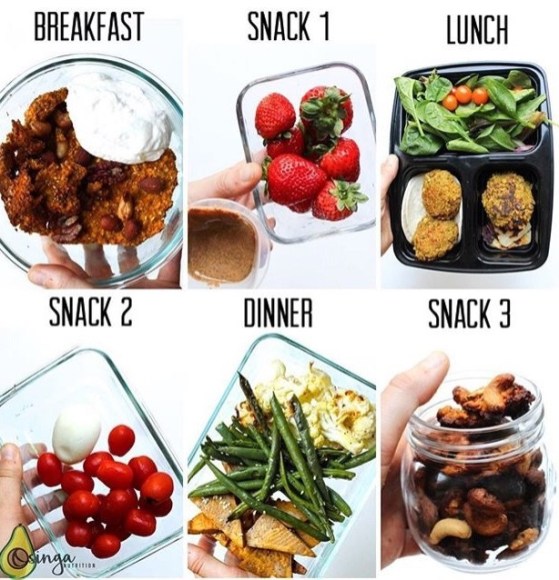What's the best way to boost your metabolism?
By Julia Kirkpatrick, MS
_________________________________________________________________________________________________________________
We all know that ONE friend who seems to be able to eat whatever they want and still keep a lean body with great curves!
They’re kind of annoying, right? It seems that we just got the short end of the stick, cursed with a slow metabolism and maybe poor genetics?

That being said, the question of the day is: What is the best way to boost your metabolism?
There are two options that many people consider:
Option 1: Should I eat small, frequent meals throughout the day?
OR
Option 2: Should I stick with the typical breakfast, lunch and dinner (three meals a day) scheme?
First, we need to know a little bit about metabolism!
Resting metabolic rate (RMR) is the largest component of daily energy expenditure (makes up about 60-75%) and is the energy required for basic function of your body at rest [2].
Note that most of these factors are outside of your control (genetics, age, and gender).
However, lean tissue (muscle) IS within our control to a much greater degree and it increases metabolic rate (muscle is very expensive).
So, if you’re looking to ‘boost’ your metabolism, one solution is to gain some muscle ;)

Now back to the original question.
It’s been a popular idea that smaller meals (people often say six) throughout the day will ‘boost’ metabolism and potentially burn more energy through the thermic effect of food (TEF).
What’s the thermic effect of food (TEF)?
The thermic effect of food is when your body temporarily increases energy expenditure in order to break down and store food.
This amount typically equates to 10% of your daily energy expenditure, depending on your what macronutrients (carb, protein, or fat) you’re consuming.
Total Energy Expenditure
Each macronutrient takes different amounts of energy to metabolize, with protein as the costliest! [2]
BUT, when calories are equal, meaning you’re eating the same number of calories through 3 meals a day or smaller meals and snacking, your metabolism isn’t going to ‘speed’ up and burn more energy (or help you lose extra fat).
Research comparing the two eating conditions has demonstrated there are no significant differences in body composition, metabolism, thermic effect of food, or total energy expenditure between the two conditions [3].
So, the good news: it doesn’t matter which option you choose!
If you’re the type that is super busy and has minimal time to eat and/or make food – go with fewer meals a day (let’s say the traditional breakfast, lunch, and dinner).
If you’re the type that loves to have small little snacks and graze throughout the day – go for it! Smaller, more frequent meals are the way for you.
The ‘bad’ news: either option you choose will NOT alter your metabolism in a significant way! [3].

However, there have been a few added benefits linked with increased meal frequency outside of metabolism.
When it comes to general health, some research has shown that increased meal frequency improves:
Glucose response – improved fasting plasma glucose and decreased insulin response after food is eaten! [3,4]
Blood profile – decreased total cholesterol, LDL levels, and blood pressure [3]
When it comes to female athletes, there might be a benefit of consuming more frequent meals throughout the day, perhaps “due to the anabolic stimulus of exercise training and how ingested nutrients are partitioned throughout the body.” [3].

There is SOME research that also shows improved body composition with increased meal frequency, but this is still up for debate! [1]
Similarly, it appears beneficial to increase meal frequency during hypocaloric (eating less calories than you’re burning) conditions in order to minimize muscle tissue loss, maximize fat loss, and potentially increase muscle tissue [5].

However, these research findings are in their early stages!
The Main Takeaway Points:
Your metabolic rate will not be affected by how many meals you consume!
Whether you eat 3 meals or 6, it largely does not have a significant impact on overall body composition – eat depending on what works into your schedule!
There MAY be a few benefits to eating more frequently, but it is more important to remember our nutritional priorities (think calorie balance and macronutrients)
References:
Iwao, S., Mori, K., & Sato, Y. (1996). Effects of meal frequency on body composition during weight control in boxers. Scandinavian Journal of Medicine & Science in Sports.,6(5), 265-272.
Jeukendrup, A., & Gleeson, M. (2019). Sports Nutrition (Third Edition). Champaign, IL: Human Kinetics
La Bounty, P. M., Campbell, B. I., Wilson, J., Galvan, E., Berardi, J., Kleiner, S. M., … Antonio, J. (2011). International Society of Sports Nutrition position stand: meal frequency. Journal of the International Society of Sports Nutrition, 8(1). https://doi.org/10.1186/1550-2783-8-4
Munsters, M. J. M., & Saris, W. H. M. (2012). Effects of Meal Frequency on Metabolic Profiles and Substrate Partitioning in Lean Healthy Males. PLoS ONE, 7(6), e38632. https://doi.org/10.1371/journal.pone.0038632
Schoenfeld, B.J., Aragon, A.A., & Krieger, J.W. (2015). Effects of meal frequency on weight loss and body composition: a meta-analysis. Nutrition Reviews, 73(2), 69–82. https://doi.org/10.1093/nutrit/nuu017





